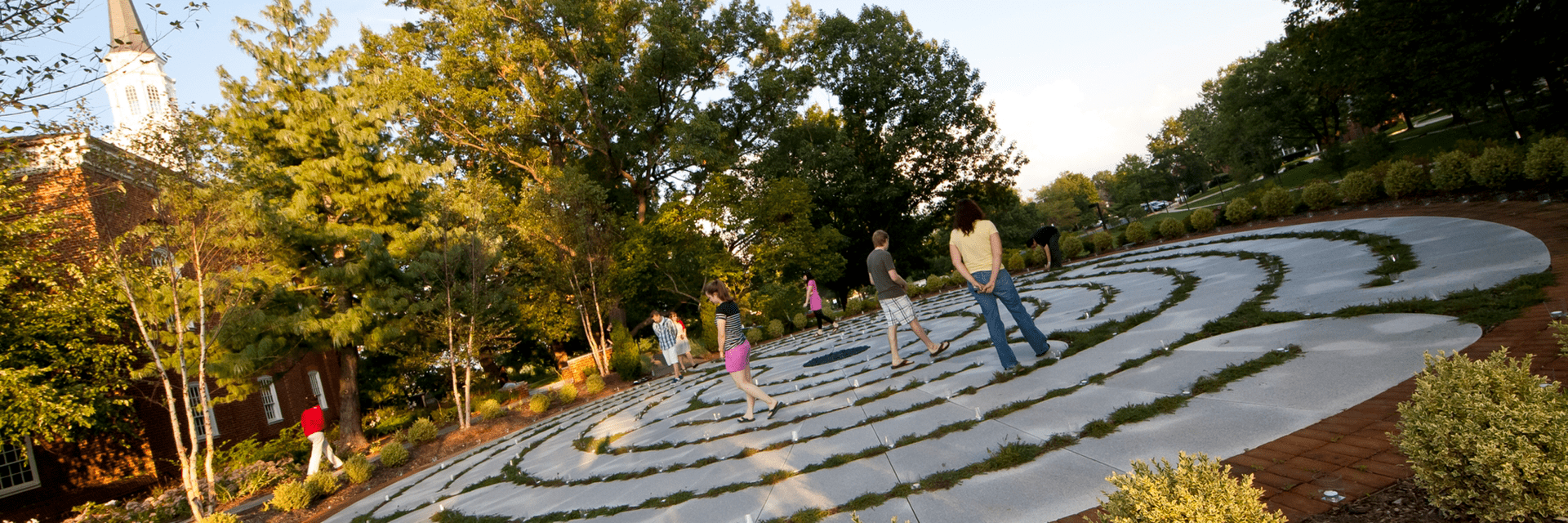What are Climate Emotions?
Climate emotions are a broad category of feelings we experience in response to unfamiliar changes in the world that result directly or indirectly from the changing climate. As everything we have grown familiar with in our physical environments bears the changes associated with a warming world, the reality of this uncertainty is bringing a range of unexpected (and often uncomfortable) emotions to bear in our daily lives.
One of the most pressing emotions related to the changing climate is climate anxiety. As defined by the Cleveland Clinic, “climate anxiety is characterized by a chronic fear of environmental doom that’s often paralyzing and debilitating, and it can sometimes be exacerbated by existing anxiety disorders”. You may experience anxiety when you get news of disasters around the globe or wildfire smoke in your neighborhood.
Not all emotions relating to the climate are negative. When walking around campus in the spring, you may experience joy from blooming cherry blossoms and other flowering plants.
All the emotions that come from interactions or news of the climate are valid. Society will have to recalibrate itself to handle these new waves of fear, sadness, anger and even positivity. For more nuanced definitions and general resources about climate emotions, click the cards below.
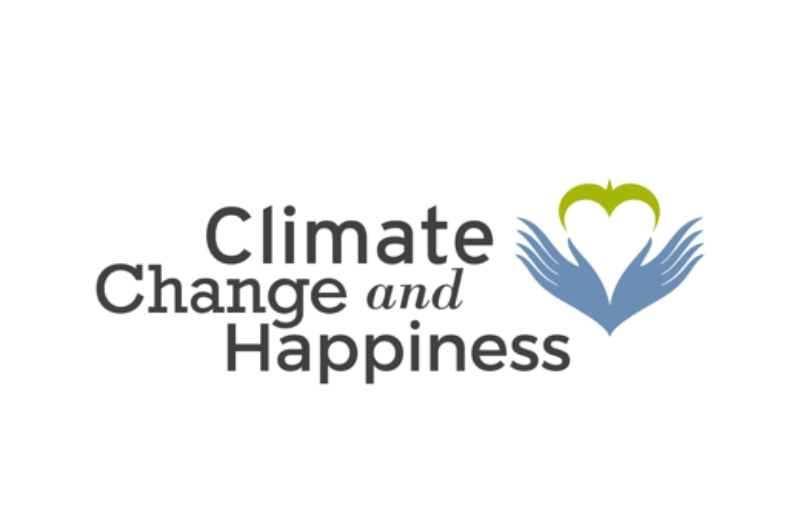
Toward a Taxonomy of Climate Emotions
Pioneering journal article and podcast with a clinical psychologist.
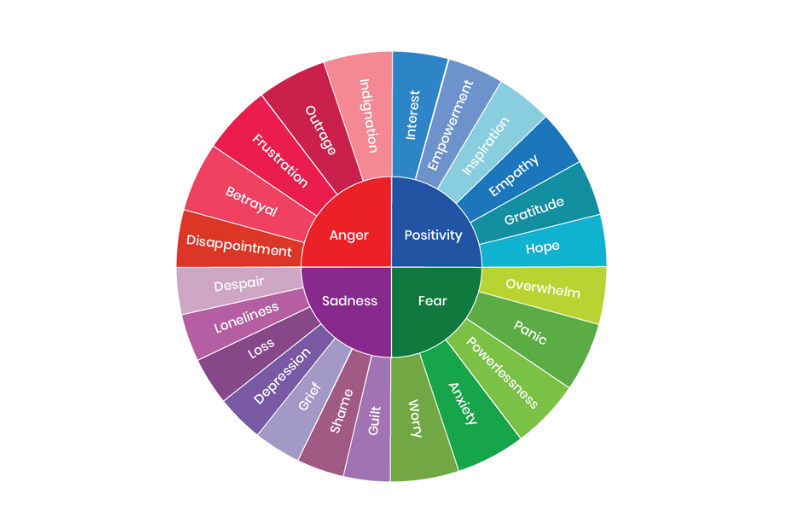
Climate Emotions Wheel
Use this visual tool to better understand your feelings related to the climate crisis.
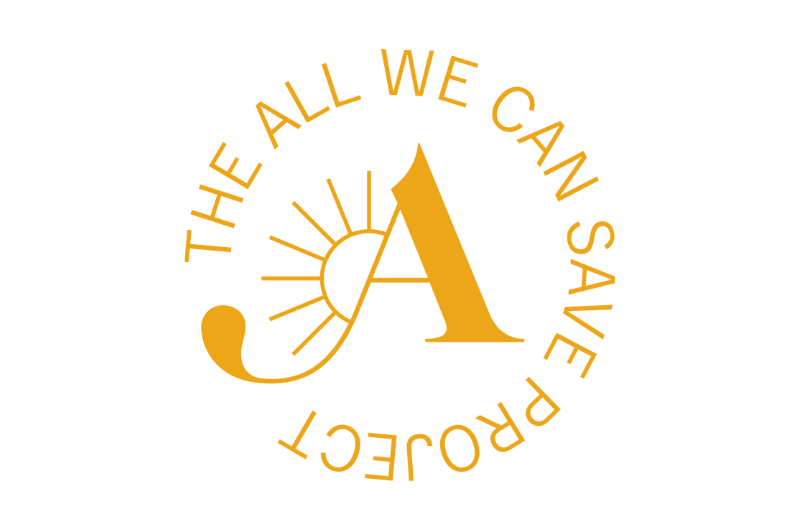
All We Can Save Project
A non-profit with comprehensive resources tackling climate emotions.
Resources at UMD
Mental Health & Well-Being @ UMD website
A new mental health resource guide (shared with campus on 9/4/24 by President Pines)
We are pleased to share a new online resource for our undergraduate and graduate students, faculty, staff, and parents and families. The new mental health website is a collection of mental health and well-being resources available to our community on a variety of topics, including crisis support, counseling, academics, wellness and connection. We encourage you to bookmark the website for yourself, and share with others.
Coping with Climate Anxiety Toolkit
The Office of Sustainability has compiled a list of some coping strategies to help navigate the stress and anxiety that our current climate crisis can trigger.
UMD Counseling Center
The Counseling Center provides comprehensive support services that promote the personal, social, and academic success of UMD students. Within the Counseling Center, students may seek help from the Counseling Service, Accessibility & Disability Service, and the Testing Office.
Consultation and referral services also are available to UMD faculty, staff, parents, and guardians.
Health Center
College is an exciting time of opportunities and self-discovery; however, there are times when students may struggle with depression, anxiety, and other mental health illnesses that require medical attention. The Behavioral Health Service provides confidential services for registered UMD students including medication evaluation and management, crisis intervention, and psychotherapy.
Wekesa Earth Center
The Wekesa Earth Center generates nature-based research, honors transgressed communities of nature disenfranchisement, and uses programs to advocate the restorative benefits of nature. Explore their programming offerings like forest bathing on their website.
Arts for All
President Pines announced five bold actions on the day he was inaugurated; the first was Accelerating UMD's Climate Action Plan goal to become a Net-Zero Carbon campus by 2025, and the last was Expanding Arts Programming Across Campus. The Arts for All program may be just as important to all Terps becoming climate ambassadors as the technical strategies that UMD is using to reduce and draw carbon out of the atmosphere.
Art is a way to engage with our emotions and it can sharpen our self awareness and regulation skills for connecting with the challenges of climate change. The Fifth National Climate Assessment included an art gallery to show Americans' collective responses to the changing climates of the United States. Recent public health research shows that creating community climate art is an effective approach to navigating climate emotions.
Collaborative creative practice is necessary to take action on climate change. The mission of Arts for All is to humanize grand challenges--such as the challenges brought on by a changing climate-- and to center people-based, creative processes as we work collectively to address them.

Dance
Dance Work Seeks to Convey Toll of Climate Catastrophe: Clarice Artists-in-Residence Use Technology to Create a Disorienting New World

Music
Hearing and Seeing Climate Change, Through Music and AR: Performance at The Clarice and its Virtual Reality Element Bring Listeners to Chesapeake Bay

Visual Art
UMD's new Creative Placemaking Minor is a collaboration between the School of Architecture, Planning, and Preservation and the College of Arts and Humanities. Read more about a local class project .
Book Recommendations by Office of Sustainability
The first of its kind, this anthology of essays was released in May 2024 and has an accompanying website that is full of useful resources like upcoming events, workshops and bios of psychologists, social workers and facilitators who are leading in the new space of climate emotions and healing.
Kim Stanley Robinson is an acclaimed science fiction writer who has been recognized for sh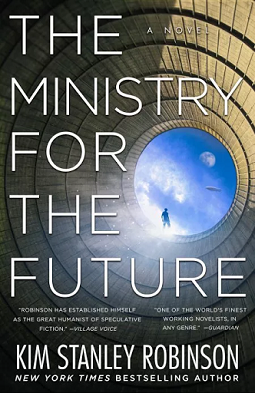 aring his imagination in service to society. The Los Angeles Book Review sums up a major theme of this novel: "The brilliance of The Ministry for the Future is that it knows there is no one solution to the fundamental problem of human psychology; some people in the novel need eco-religion, some people need scientific debate, some people need to be convinced there’s more money in a sustainable future than in civilizational collapse, some people only respond to violence, like it or not. There are many roads to enlightenment, the novel seems to be suggesting. Pick whichever road will take you there, and go."
aring his imagination in service to society. The Los Angeles Book Review sums up a major theme of this novel: "The brilliance of The Ministry for the Future is that it knows there is no one solution to the fundamental problem of human psychology; some people in the novel need eco-religion, some people need scientific debate, some people need to be convinced there’s more money in a sustainable future than in civilizational collapse, some people only respond to violence, like it or not. There are many roads to enlightenment, the novel seems to be suggesting. Pick whichever road will take you there, and go."
The First Year Book from 2022, All We Can Save: Truth, Courage, and Solutions fo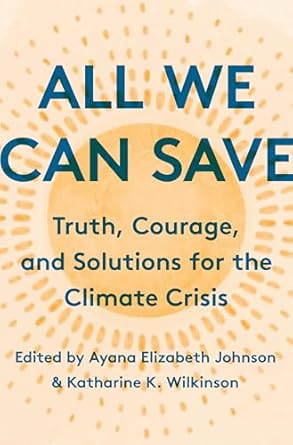 r the Climate Crisis is an anthology of essays, poetry, and art by a diverse group of women “at the forefront of the fight against the climate crisis—harnessing truth, summoning courage, and offering solutions to lead humanity forward.” Look for a copy at the UMD Libraries.
r the Climate Crisis is an anthology of essays, poetry, and art by a diverse group of women “at the forefront of the fight against the climate crisis—harnessing truth, summoning courage, and offering solutions to lead humanity forward.” Look for a copy at the UMD Libraries.
As a botanist, Robin Wall Kimmerer has been trained to ask questi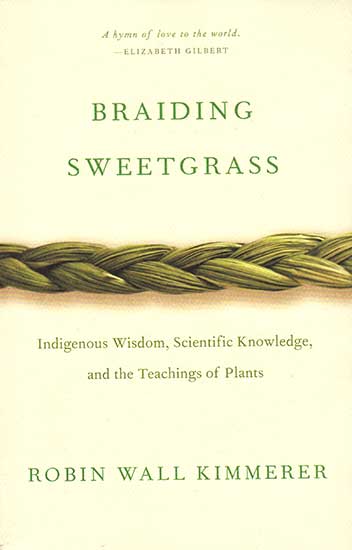 ons of nature with the tools of science. As a member of the Citizen Potawatomi Nation, she embraces the notion that plants and animals are our oldest teachers. In Braiding Sweetgrass, Kimmerer brings these two lenses of knowledge together to take us on “a journey that is every bit as mythic as it is scientific, as sacred as it is historical, as clever as it is wise” (Elizabeth Gilbert).
ons of nature with the tools of science. As a member of the Citizen Potawatomi Nation, she embraces the notion that plants and animals are our oldest teachers. In Braiding Sweetgrass, Kimmerer brings these two lenses of knowledge together to take us on “a journey that is every bit as mythic as it is scientific, as sacred as it is historical, as clever as it is wise” (Elizabeth Gilbert).
"In Generation Dread, Britt Wray seamlessly merges scientific knowledge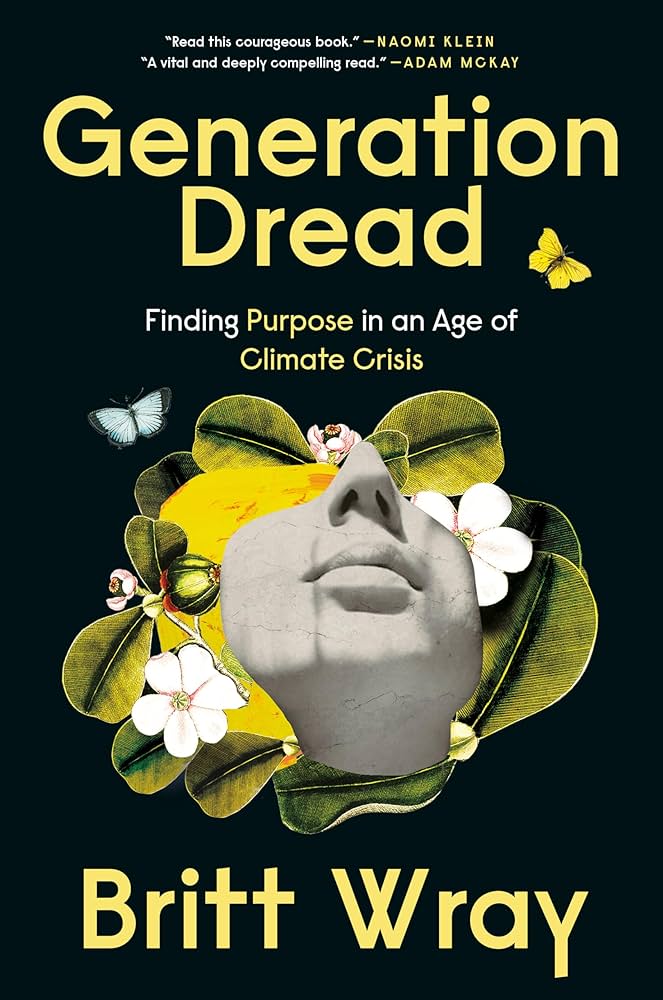 with emotional insight to show how these intense feelings are a healthy response to the troubled state of the world. The first crucial step toward becoming an engaged steward of the planet is connecting with our climate emotions, seeing them as a sign of humanity, and learning how to live with them. We have to face and value eco-anxiety, Wray argues, before we can conquer the deeply ingrained, widespread reactions of denial and disavowal that have led humanity to this alarming period of ecological decline."
with emotional insight to show how these intense feelings are a healthy response to the troubled state of the world. The first crucial step toward becoming an engaged steward of the planet is connecting with our climate emotions, seeing them as a sign of humanity, and learning how to live with them. We have to face and value eco-anxiety, Wray argues, before we can conquer the deeply ingrained, widespread reactions of denial and disavowal that have led humanity to this alarming period of ecological decline."
Campus Academic Programs
All majors and minors on campus can be connected to climate change and related climate emotions. The below programs are just a few of the disciplines that can directly relate to and support climate emotions.
Anthropology
Anthropology is a scientific and humanistic discipline devoted to improving our understanding of human culture and diversity. Anthropologists are holistic in that they endeavor to describe in the broadest sense what it means to be human. This includes exploring relationships between the human past and the present as well as between the biological and social components of our species.
Anthropology of Environment focuses on the anthropological assessment of environmental issues, the management of natural resources and the study of biological, cultural and behavioral factors as they impinge upon our understanding of the environment and our ability to respond to environmentally based opportunities, problems, and crises.
Family Science
The Family Science major focuses on the study of families, their health and well being, and the social determinants that affect family life and health. The major offers excellent training in scientific methods to understand family systems, their interactions with broader societal structures, and strategies to enhance their health, well-being, and functioning. Family systems are also impact by the climate and climate change. Consider researching how family life and health is intertwined with climate.
Human Development
The Human Development Program focuses on studies of developmental changes in social behaviors, social cognitions, and social relationships and how such changes are related to, caused by, or predictive of features of cognitive, emotional, motivational, neuropsychological, and psychopathological development. Explore how the climate can impact emotions, motivation to combat climate change, and more through the study of human development.
Humanities, Health & Medicine Minor
The ARHU minor in Humanities, Health, and Medicine engages students in an interdisciplinary curriculum that applies the methods, perspectives, and insights of the arts and humanities to health and medical education as well as practice. Through an exploration of human health and medicine using the inter-disciplinary questions and research methods of literary and cultural studies, as well as the arts, philosophy, communication, and history, the minor aims to develop and nurture skills such as empathy, ethical understanding, socio-cultural analysis, self-reflection, and an appreciation of diversity and inclusion that are essential for humane and effective medical care as well as sound health policy. The climate impacts human health. Consider exploring how climate and health are connected through this minor.
Kinesiology
Kinesiology focuses on the complex role of physical activity in our health and well-being throughout life. Yet, physical activity and sport are more than essential components of maintaining health. Our department explores the historical, cultural, economic, developmental, cognitive, neuromotor and physiological aspects of our engagement in physical activity. Explore how the Wekesa Earth Center relates the historical, cultural, and environmental aspects of engagement to physical activity.
Marketing
At its very essence, marketing revolves around people. It hinges on understanding both the consumer and the marketplace to devise products, services and experiences that deliver superior value not only to customers but also to society at large. Explore ways to market and advertise products and services that support the management of climate emotions
Psychology
Psychology is a remarkably broad field that studies mind and behavior at all levels of analysis ranging from the micro to the macro; from single cells to complex systems; from individuals to groups and cultures; and from invertebrates to humans. Consider expanding on the relation between mind and behavior as it relates to the changing climate.
Sociology
Sociology is the study of people's everyday behavior in small group and societal contexts. The University of Maryland’s Department of Sociology offers an emerging area in Environmental Sociology, which focuses on diverse approaches to understanding the relationship between society and the natural environment. Research in this sub-field spans multiple levels of analysis and methodological approaches, and readily connects with other sociological fields, including social psychology; demography; political sociology; gender, work and family; and globalizing theory.
Ways to Take Action
Join a Student Group
One of the best ways to connect with the campus community is to join a student organization. Some people find connecting with others who share similar views on the climate crisis comforting. There are dozens of student organizations on campus that center on sustainability. View a highlighted list on the OS website and a comprehensive list of all student organizations on Terplink.
Volunteer in College Park and PG County
Another way to actively mitigate climate anxiety is to invest in communities that neighbor College Park. There are opportunities to plant native flowers, design culturally appropriate landscaping, and contribute to additional sustainability-related projects. Visit the Office of Community Engagement to find opportunities that connect with your interests.

